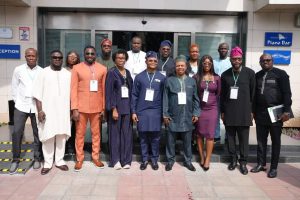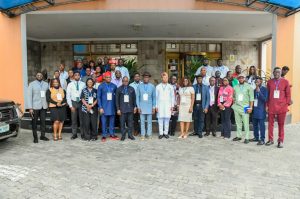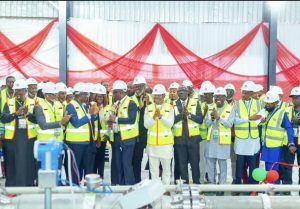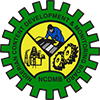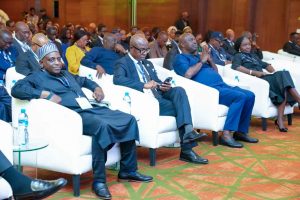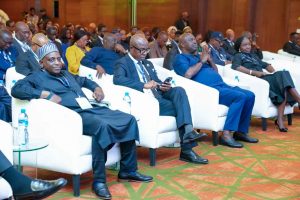 The Executive Secretary, Nigerian Content Development and Monitoring Board, (NCDMB) Engr. Simbi Wabote on Wednesday inaugurated the Project Management Office for Project 100, an initiative launched by the Minister of State for Petroleum Resources, Dr. Emmanuel Ibe Kachikwu on January 31, 2019.
The Executive Secretary, Nigerian Content Development and Monitoring Board, (NCDMB) Engr. Simbi Wabote on Wednesday inaugurated the Project Management Office for Project 100, an initiative launched by the Minister of State for Petroleum Resources, Dr. Emmanuel Ibe Kachikwu on January 31, 2019.
Members of the PMO were drawn from the Ministry of Petroleum Resources, the Nigerian National Petroleum Corporation (NNPC) and Petroleum Technology Development Fund (PTDF) and they would function within the NCDMB. The PMO would be supported by KPMG, an international consultancy that has been working on the project.
Speaking at the ceremony at the NCDMB Abuja liaison, the Executive Secretary said the members were carefully selected in view of the relevance of their functions in the delivery of the Supplier Development Programs that will drive the growth of Nigerian service companies.
He listed five key areas the PMO will focus on to include managing the ongoing process and refinement of Project 100 strategy, managing the selection, acceleration and graduation process of Project 100 beneficiaries and managing the implementation of initiatives for the various target beneficiaries. Other assignments include developing fact based documentation of performance of Project 100 interventions and impact on local content and managing wide relationships and partnerships with public and private sector entities that support the delivery of Project 100 initiatives and interventions.
He charged members of the PMO to work assiduously to create a pool of high performing large scale enterprises that will impact positively on job creation, retention of industry spend within the Nigerian economy, development of skilled manpower, robust policies, and access to credible data.
Wabote also directed members of the PMO to identify the various areas of interest of the beneficiaries and provide them opportunities with the collaboration of the National Petroleum Investment Management Services (NAPIMS). He added that “while we would engage in public tendering, we have to specially look for opportunities. We also need to engage Nigeria Liquefied Natural Gas (NLNG) and other organizations that carry out procurement outside the Nigerian Petroleum Exchange (NIPEX) System. Project 100 companies must be included in the bidders list of such organizations.”
Making a presentation on the operating guidelines of the PMO, the General Manager, Research Strategy and Development, NCDMB, Mr. Abdulmalik Halilu explained that the concept of Project 100 was to identify and grow indigenous companies from small players to large enterprises. He said the project hoped to support such companies to grow their annual turnover from about N100m to over N500m, increase job creation and their local content level, train more manpower and acquire cutting edge technology.
He listed factors that determined the selection of the beneficiaries to include their impact in the oil and gas sector, status of their registration on the Nigerian Oil and Gas Industry Joint Qualification System (NOGICJQS), compliance with Nigerian Content and their level of regulatory compliance. Other considerations he said, included their ownership status, compelling business plans submitted by the companies and their baseline commitments.
Halilu stated that key performance indicators for Project 100 would include “percent increase in business turnover, percentage increase in employment, percentage increase in local content level from contracts executed and percentage increase in personnel training and certification.”
Support that would be provided to the beneficiaries are Non-Financial interventions and Financial Linkages. The Non-Financial interventions include policy interventions, access to market, capacity building, research development and business insight. The financial linkages include letters of recommendation to access intervention funds and highlighting collaborative opportunities between beneficiaries to enable them take on larger projects.
According to the project execution timeline, the Project Management Office would begin in March 2019 to engage beneficiaries to revalidate expectations and thereafter develop execution plans for targeted interventions. From June 2019 to December 2020, the PMO would begin to implement targeted interventions.
Discover more from Nigerian Content Development & Monitoring Board
Subscribe to get the latest posts sent to your email.

